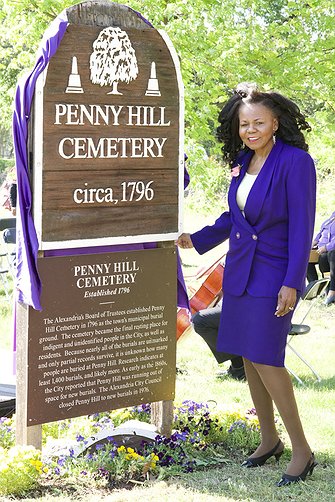Wednesday, April 24, 2024
For Joseph McCoy, there were no lawyers, no legal proceedings, no testimony, no trial, no safety. Instead, the 18-year-old, who had been accused of assaulting the 9-year-old daughter of his employer, was dragged from his jail cell to the corner of Cameron and Lee streets and lynched by an angry mob who had breached the police station.
The date was April 23, 1897, and newspapers throughout the region carried the news of the brutal slaying.
“Hanged by a mob,” read the headline in the Alexandria Gazette. “The righteous indignation of old Alexandria was aroused last night … and as a result Joseph McCoy, a negro ravisher, was strung up to a lamp post, bullets sent into his body, his head split open with an axe and other indignities heaped upon his quivering remains.”
On April 23, the Alexandria Community Remembrance Project held a wreath laying ceremony at Penny Hill Cemetery to mark the 127th anniversary of McCoy’s death.
Mayor Justin Wilson led a slate of speakers that included Interim Police Chief Raul Pedroso, Roberts Memorial United Methodist Church Rev. Josette Franklin, and Audrey Davis, Director of the African American History Division of the Office of Historic Alexandria.
McCoy’s death was one of two documented lynchings in Alexandria, out of 11 that occurred in Northern Virginia, and among the 100 documented lynchings that occurred in the Commonwealth between 1882 and 1968.
Though hundreds of Alexandria residents witnessed the event, no one was ever charged in McCoy’s murder.
An angry crowd had breached the police station jail, located at the site of today’s City Hall, and dragged McCoy out of the station house to the intersection of Cameron and Lee streets. It was there that they put a rope around his neck.
McCoy was buried in a pine coffin supplied by the state of Virginia because his family had refused to pay for the cost of the funeral.
“As the people killed him, they will have to bury him,” said an aunt to the Alexandria Gazette at the time. McCoy was buried in Penny Hill Cemetery, a cemetery for the indigent, in a pauper’s grave.
“The damage to the city of Alexandria is incalculable,” reported the Richmond Planet, an African American newspaper. “It places that community before the world as a city of lawlessness, where officials disregard their oaths of office and without warrant or excuse suspend the law. What must be thought of a people who would elect such material to office? It shows that the city government is rotten to the core.”
As part of a weekend of remembrance, City Hall and the George Washington Masonic Memorial were illuminated in purple, the color of mourning, in honor of McCoy. Special this year is a self-guided remembrance walk created by ACRP. The walk can be accessed online at www.alexandriava.gov/cultural-history/joseph-mccoy-remembrance-walk.
To learn more about Joseph McCoy and the events of April 23, 1897, visit the In Memoriam page at Alexandriava.gov/Historic.
